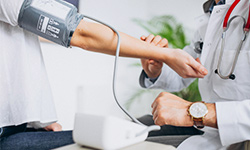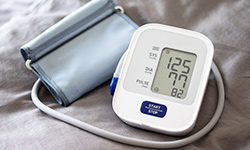
Collaborate and Control: Doctor’s Role in Controlling High BP

Table of Contents
When it comes to medical problems, self-diagnosis and self-treatment has become a concern in current times. One should remember that treatment for any medical issue is only as effective as the diagnosis. Therefore, reaching out to the most credible person, your doctor is essential.The growing number of people self-diagnosing various medical conditions and diseases, especially hypertension, has raised concerns. So, this Doctor’s Day, we would like to take the opportunity to create awareness about the role of a doctor in helping patients control and prevent high blood pressure. We hope to discourage self-diagnosis and encourage seeking help from certified professionals in the field of cardiology.
Hypertension is a lifestyle disease that requires regular monitoring. The assortment of home blood pressure monitors available in the market necessitates the need for proper guidance and counselling on controlling blood pressure. Apart from primary and secondary hypertension, there are several other types of hypertension that might affect you. So, along with reading multiple articles on how to reduce high blood pressure, seek expert help as well, through your cardiologist or family doctor to maintain your heart health.
How to control high blood pressure? There’s a simple way out.
If diagnosed with hypertension, make sure you cooperate and communicate with your doctor. Maintaining the ideal blood pressure level takes effective communication, a proper diagnosis, and the right treatment. Therefore, working together with your doctor is imperative in tackling high blood pressure successfully.
How to Collaborating with Your Doctor for Effective Hypertension Management
The best method to increase effective communication with your doctor is to follow a set of parameters:
Inquire about your blood pressure levels regularly during check-ups. If it’s slightly higher than the ideal value, monitor your blood pressure regularly – either at home or at the doctor’s clinic. Remember to follow-up with your doctor based on their recommendations
Keep a tab on your blood pressure values. Learn about each value and how it’s affecting your overall health. Monitor your medication and blood pressure levels, and get all your queries addressed from your doctor as and when they come to mind.
Don’t expect instant results. Make sure you slowly but steadily reach toward your blood pressure goal. Sometimes, lifestyle changes may not be enough, and you might have to take medications. Keep in regular touch with your doctor and chalk out the best plan for yourself
Discuss underlying issues with your doctor. Make sure you lay out all your health issues on the table to help the doctor create a customised program for you and suggest the right treatment
Taking precautionary measures and constant consultation with your doctor helps in proper monitoring of your blood pressure levels.
However, if you’re not diagnosed with hypertension and follow a sedentary lifestyle, you are at risk of developing hypertension. Therefore, as a precautionary measure, you can monitor your blood pressure readings every two years after you turn 18. If you have a family history of hypertension, get your blood pressure levels checked every year (heredity is one of the major causes of high blood pressure).
If you are above 40 years of age and don’t have hypertension yet, you should check your blood pressure levels annually. The risk of getting hypertension increases as you grow older. Get a complete health check-up done every year to monitor your blood pressure levels as well as your overall body health.
Besides monitoring your blood pressure, learn to ask the right questions to your doctor or cardiologist. Before your appointment, jot down a list of questions for which you need an expert’s opinion and knowledge. The list of questions may include,
- Symptoms related to your medication
- Underlying medical issues
- Diet
- Personal habits and lifestyle
- Current blood pressure levels
An expert doctor’s diagnosis and knowledge go a long way in treating the problem of hypertension at its root. That being the case, reaching out to the right doctor is essential and refraining from self-diagnosing and treatment. If you have any more questions, feel free to get in touch with an expert doctor nearest to you. Use our “Find a physician” service to get in touch with a doctor immediately.
Note of caution: This article is for information purpose only. Always consult your doctor in case of any blood pressure or other health-related problems.
Disclaimer
The information contained in this article is to educate, spread awareness in relation to hypertension and other diseases to the public at large. The contents of this article are created and developed by BPinControl.in through its authors, which has necessary, authorisations, license, approvals, permits etc to allow usage of this articles on The Website. The views and opinions expressed in this article are views, opinions of the respective authors and are independently endorsed by doctors. Although great care has been taken in compiling and checking the information in this article, The Website shall not be responsible, or in any way liable for any errors, omissions or inaccuracies in this article whether arising from negligence or otherwise, or for any consequences arising therefrom. The content of this article is not a substitute for any medical advice. The Website shall not be held responsible or liable for any consequence arising out of reliance on the information provided in the article.

 Inquire about your
Inquire about your  Keep a tab on your blood pressure values. Learn about each value and how it’s affecting your overall health. Monitor your medication and blood pressure levels, and get all your queries addressed from your doctor as and when they come to mind.
Keep a tab on your blood pressure values. Learn about each value and how it’s affecting your overall health. Monitor your medication and blood pressure levels, and get all your queries addressed from your doctor as and when they come to mind. Don’t expect instant results. Make sure you slowly but steadily reach toward your blood pressure goal. Sometimes, lifestyle changes may not be enough, and you might have to take medications. Keep in regular touch with your doctor and chalk out the best plan for yourself
Don’t expect instant results. Make sure you slowly but steadily reach toward your blood pressure goal. Sometimes, lifestyle changes may not be enough, and you might have to take medications. Keep in regular touch with your doctor and chalk out the best plan for yourself Discuss underlying issues with your doctor. Make sure you lay out all your health issues on the table to help the doctor create a customised program for you and suggest the right treatment
Discuss underlying issues with your doctor. Make sure you lay out all your health issues on the table to help the doctor create a customised program for you and suggest the right treatment
Comments (8)
Ravi
Who is the right person to consult to outline a proper diet plan to lower high BP?
Chinmayi
How soon can I expect my blood pressure to become normal after taking medications?
Shweta
If I have normal blood pressure, do I need to monitor it regularly just as a precautionary measure?
Abeer
What lifestyle changes can I make to bring down my blood pressure readings?
Add your comment